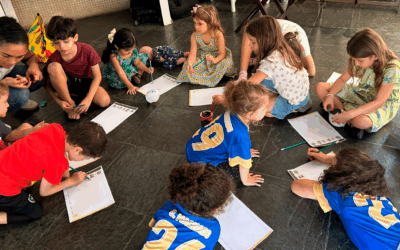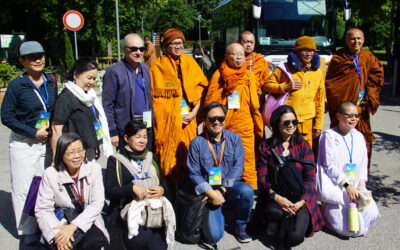Jesus freely announces his message to men and women of different nationalities and cultures who are willing to listen to him; it is a universal message, addressed to all and which everyone can welcome to be fulfilled as people, created by God Love in his image. A shared tragedy Several years ago we moved with our four daughters from war-torn Lebanon to Tasmania where we struggled to integrate into a world that was so different to ours: the people here are very reserved and the “nuclear” family is in stark contrast to the “extended” family of our country. Not long after our arrival, one of my husband’s colleagues lost his two-year-old son in a fire. Thereafter, he and his wife refused to receive visitors and meet people, and remained almost segregated at home. We could not understand this attitude because in our culture tragedies are shared. We wondered how to love them, taking that pain on us too. So, for a few weeks, I cooked for them every day, leaving the food outside the door with a note, without disturbing them. One day the door finally opened and since then a friendly relationship has been born between us and them. Over time we have made other friends who enrich us with their culture. And now in our house there is always someone who comes to visit us, a bit like in Lebanon. (Carole – Australia) Inculturation They say that to get under someone else’s skin you need to speak their language but this is not always necessary. I have witnessed this with the many people I have treated (I am a doctor) and with whom I have built a relationship, a message has passed. Once, in Cameroon, I asked a local elder for advice about how to identify with his people. He said: “If you love with your heart, others will understand. It’s enough to love.” He brought me back to the essentials of the Gospel which was confirmation that sharing others’ sufferings and joys comes before everything else. If I also manage to go into depth with the local language and customs, all the better… Wherever we find ourselves, love is the most eloquent word to express God’s paternity. (Ciro – Italy) The support not to let go After our divorce I continued to meet with my children. But over time, my ex-wife’s blackmail, demands and accusations increased… I was afraid she had advisors who were not really helping her. The most painful ordeal was when even the children, especially the oldest, began to accuse me of having ruined their lives. I did not know what to do anymore. Every time we met, it became hell. A priest friend helped me greatly when he suggested I should love without expecting anything. I decided to try and follow his words for a few months. When my mother-in-law fell ill and became bedridden, I took care not only to visit her frequently but also to make things as light as possible for her. One day, as I was keeping her company my daughter arrived. She found her grandmother serene and amused as we were arranging old photo albums. Something must have changed in her because that same evening she called me to ask my forgiveness. It’s a difficult mountain to climb but every time I try to love I find the support I need not to give up. (V.J. – Switzerland) Coloured My husband Baldwyn and I are coloured, a mestizo race that often suffers from serious marginalisation. My mother was African, my father Indian. He died after I was born so my mother and I went to live with her black relatives whose traditions I was familiar with. But as the years went by, I realised that I was different and was often laughed at. When Baldwyn and I decided to get married, it came as a real blow to discover that I was not registered anywhere and so did not exist in the eyes of the state: once again I felt rejected! During that difficult period, circumstances led us to meet different Christian families, black and white: they belonged to the New Families Movement and treated everyone equally. In that environment I felt at ease for the first time, welcomed for what I was. The attention I received from those people made me discover that God loved me. I was able to accept myself with my differences and others as well. I became free. (Gloria – South Africa)
edited by Stefania Tanesini
(taken from Il Vangelo del Giorno, Città Nuova, year VI, no.5, September-October 2020)




0 Comments